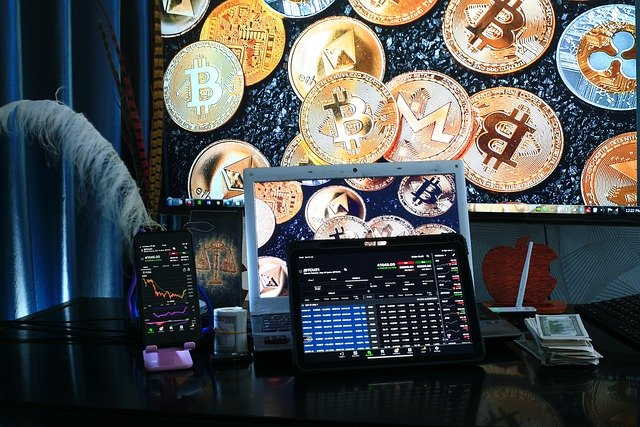Experts are debating whether cryptocurrency is a currency or an investment, even though it shares many features with both. You can buy things with cryptocurrency, as the name says. Cryptocurrencies aren’t yet widely accepted by stores and other businesses, so your purchasing power is constrained. The lack of widespread adoption of crypto and its volatility limit its potential as a medium of exchange.
Cryptocurrency is seen by many as an alternative kind of investing. It’s possible to acquire and sell cryptocurrencies with the expectation that their value will rise over time, allowing you to sell them for a profit in the future. Some crypto investors aren’t so much betting on the money itself as they are on the blockchain technology that underpins it.
However, identifying crypto as an investment is also a difficult task. Unlike traditional stocks and bonds, cryptocurrencies don’t have any inherent physical worth or utility. They do, however, share some characteristics with commodities like gold, including the ability to be purchased and sold for cash or as derivatives on the basis of predicted future value. It is impossible to estimate the long-term worth of cryptocurrencies because there is no clear track record to compare it to. You really don’t know where supply and demand can end up.
The uncontrolled nature of the stock market, like that of the FX market, carries considerable dangers. Your best chance is to conduct your research and avoid investing any money you cannot afford to lose. As of now, regulators are still figuring out how to classify cryptocurrencies for use in trade and payments as well as in anti-fraud and taxation programmes. It’s possible that clear regulation will help better grasping on how to utilise cryptocurrencies and what its future may hold.
Is Cryptocurrency a Safe Option?
There is no doubt that the distributed ledger technology that powers cryptocurrencies is secure because of its decentralised structure and the encryption process every transaction undergoes. Customers should be aware of exchange rate volatility, potentially large fees on exchange platforms, and fraud risk, to name just a few of the concerns. Due to the decentralised nature of blockchain and the lack of governmental regulation, it can be exceptionally difficult to reclaim your cash if they are lost or stolen.
The fact that cryptocurrency is secure does not mean it is safe. Cryptocurrency’s current popularity has been fuelled in part by investors’ conviction in the currency’s value, but that value is still dependent on speculative guesswork. Your investments should be weighed against your total portfolio and the market as a whole. To put all of your money into a single cryptocurrency is like putting all of your money into a single corporation.
What’s in store for cryptocurrency in the years to come?
In recent years, the value of Bitcoin and other cryptocurrencies has surged. In the year 2021, the value of Bitcoin has more than doubled, while the value of Ethereum has more than quadrupled.
But the long-term implications of such increase are still up in the air. This “speculative fever” for crypto and blockchain technology is being fuelled. There are still some huge, powerful players who believe in the potential of crypto.
Cryptocurrency’s value, security and long-term viability are all still up in the air. Experts, on the other hand, feel that accumulating a small amount of cryptocurrency will eventually pay off. Prior to considering an investment in bitcoin, experts emphasise the significance of familiarising yourself with its particular volatility and risk concerns.
Since no two “cryptocurrencies” are the same, it’s impossible to draw broad conclusions about them. All cryptographic tokens are referred to as “tokens” under this umbrella word.
There are blocks in the blockchain, a distributed ledger technology, which contains subsets of data. On the basis of intense calculations and cryptography, each “work” block or coin is mined in order to be approved in the block-chain. As a result, mining a new “coin” or “block” is a gruelling task that pays off in the form of a new “coin.” To “mine” or “work” a crypto money, you need high-tech equipment and a lot of energy.
Over time, the growth of cryptocurrency exchanges has aided in the evolution of cryptocurrencies. Exchanges will help create a new cryptocurrency ecosystem by making it easier for a bigger number of people to participate in cryptocurrency trading.
Conventional assets such as gold reserves are not used to secure the value of cryptocurrencies. They have value because of the market’s acceptance and belief in their democratic and decentralised utility. Modern block-chain projects provide the foundation for several crypto “coins” or “tokens.
The Positives and Negatives
The adoption of cryptocurrencies has both advantages and disadvantages. Many people are concerned that cryptocurrencies will be used in unethical or illegal ways, however there are ways to manage and regulate this through the establishment of regulated crypto exchanges and the implementation of KYC criteria.
While the ability to remain anonymous or private is an advantage, it also carries the risk having no one to turn to in the event of a loss or hack. Even small and medium-sized businesses may be able to have more access to finance and capital from a global perspective. In order to ensure the overall well-being and security of financial systems and to keep an eye on the misuse of technology-driven financial instruments, these are contentious policy problems that require rigorous consideration.
Final Words
In the beginning, cryptocurrency was envisioned as a means of exchange. For the last few years, it has become a sort of asset, whose value fluctuates as it is traded in the markets or exchanges. This innovative financial instrument has both a currency and an asset. Also, as an asset, it has a tendency to fluctuate at a quick rate over a short period of time. The price of these cryptocurrencies/crypto-assets is extremely sensitive to even a small number of “owners'” fears. The value of crypto-assets is heavily influenced by market information and crypto-exchanges.












